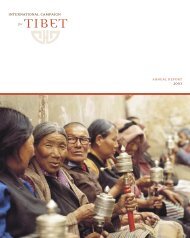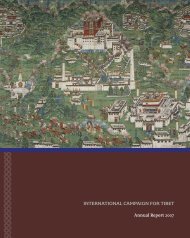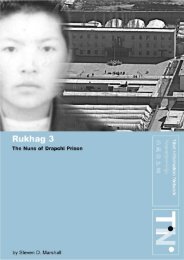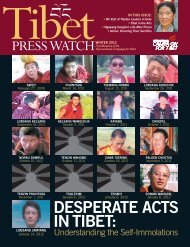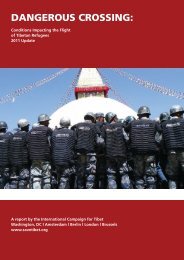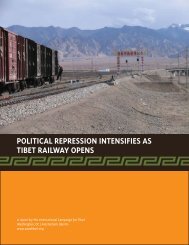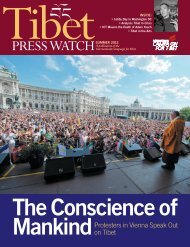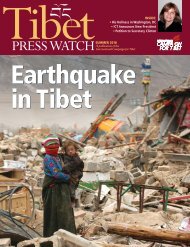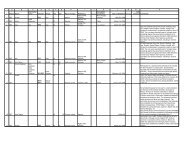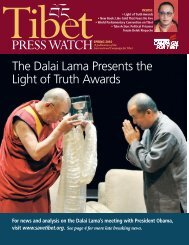download the report - International Campaign for Tibet
download the report - International Campaign for Tibet
download the report - International Campaign for Tibet
Create successful ePaper yourself
Turn your PDF publications into a flip-book with our unique Google optimized e-Paper software.
TIBET AT A TURNING POINT: THE SPRING UPRISING AND CHINA’S NEW CRACKDOWN<br />
tion Working Group. Prior to being installed as Minister <strong>for</strong><br />
Public Security, Meng was serving as Party Secretary of<br />
Jiangxi province, and is not known to have had any notable<br />
involvement in <strong>Tibet</strong>an issues at any previous stage of his<br />
career, which until he was posted to Jiangxi province had<br />
been spent entirely in Shanghai.<br />
Meng has not yet been in his post long enough <strong>for</strong> observers<br />
to discern what impact he personally is likely to have upon<br />
<strong>Tibet</strong>. However, so far at least — and perhaps unsurprisingly<br />
in <strong>the</strong> run-up to <strong>the</strong> Olympics when <strong>the</strong> Chinese government<br />
is working hard to maintain an air of normality<br />
around <strong>Tibet</strong> — Meng appears unlikely to represent any<br />
hope <strong>for</strong> re<strong>for</strong>m.<br />
Minister <strong>for</strong> Public<br />
Security, Meng Jianzhu<br />
Meng led a high-level delegation to Lhasa on March 23–24, <strong>the</strong> first such visit since <strong>the</strong><br />
unrest of March 14. The delegation included Ye Xiaowen (see above), and was hosted<br />
in Lhasa by TAR Party Secretary Zhang Qingli and TAR Government Chairman Jampa<br />
Phuntsog. The delegation visited Sera and Drepung monasteries, as well as <strong>the</strong> Jokhang<br />
Temple in <strong>the</strong> center of Lhasa, where Meng was quoted as saying that <strong>the</strong> authorities<br />
had to “continue to deepen patriotic education in <strong>the</strong> monasteries” as a result of <strong>the</strong><br />
protests, and asserting that <strong>the</strong> violence “violated <strong>the</strong> fundamental teachings of<br />
<strong>Tibet</strong>an Buddhism”. 32<br />
The o<strong>the</strong>r remaining members of <strong>the</strong> Central <strong>Tibet</strong> Work Coordination Working<br />
Group are Ma Kai, Zhang Ping and Xie Xuren (Du Qinglin, who also sits on <strong>the</strong> working<br />
group, is profiled under <strong>the</strong> description of <strong>the</strong> United Front Work Department,<br />
below).<br />
Ma Kai currently serves as <strong>the</strong> Secretary General of <strong>the</strong> State Council, <strong>the</strong> PRC’s cabinet.<br />
His role on <strong>the</strong> Central <strong>Tibet</strong> Work Coordination Working Group is <strong>the</strong>re<strong>for</strong>e<br />
likely to one of liaising with ministers and ministries who are not also represented on<br />
<strong>the</strong> working group. Prior to being made Secretary General of <strong>the</strong> State Council, Ma —<br />
who has spent his entire career in Beijing — served as <strong>the</strong> Director of <strong>the</strong> National<br />
Development and Re<strong>for</strong>m Commission (NDRC), a post which is also represented on<br />
<strong>the</strong> working group, and which is now held by Zhang Ping.<br />
The National Development and Re<strong>for</strong>m Commission has broad administrative and<br />
planning control over economic development in <strong>the</strong> PRC. Zhang Ping and Xie Xuren,<br />
112



